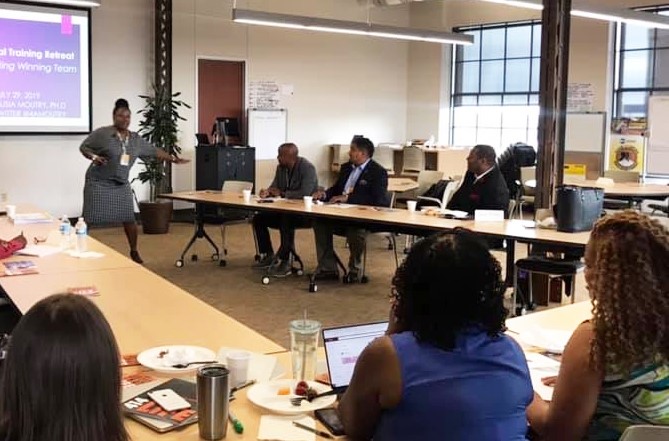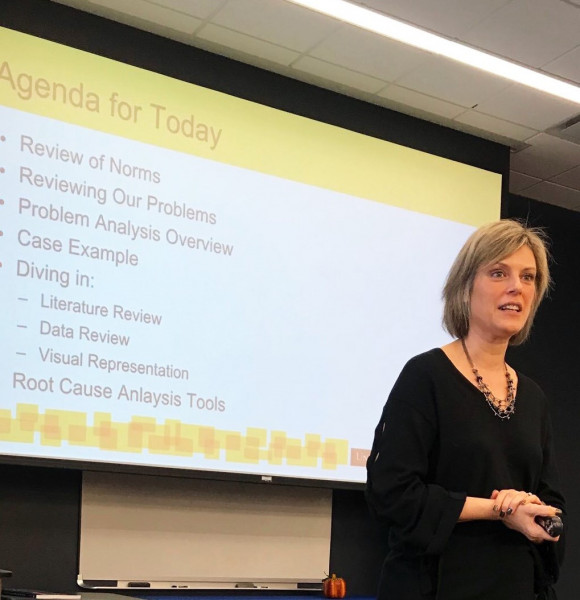New Wisconsin-Minnesota Education Partnership Wins $6.3M Federal Award
Goal is to Advance Use of Evidence-Based Education Practices in Both States
October 16, 2019 | By Janet L. Kelly

A new collaboration of Wisconsin and Minnesota education researchers formed to support education priorities in each state has won a five-year, $6.3 million grant from the U.S. Department of Education. The project's goal is to improve the academic achievement of elementary and secondary school students in the two-state region by advancing the use of evidence-based practices.
Researchers from each state’s flagship university, the University of Wisconsin−Madison and University of Minnesota, joined with Education Analytics, a Madison, Wisconsin-based education nonprofit, to develop the winning proposal.
“We are thrilled with the opportunity to build the U.S. Department of Education Wisconsin−Minnesota Comprehensive Center (WMCC) in support of educators in both states,” said Steven Kimball, principal investigator for the new center and a senior researcher at the Wisconsin Center for Education Research in UW−Madison’s School of Education.
“This award brings together a diverse team of experts in areas such as professional learning, evaluation, school leadership, special education and data analytics to help local, state and regional educators adopt and refine practices to better serve students.”

UW–Madison's Alisia Moutry, a co-director of the new WMCC, facilitates a training session on evidence-based practices for the Wisconsin Urban Leadership Institute.
Members of WMCC have extensive experience working with Wisconsin and Minnesota state education agencies, regional education support organizations, professional associations and school districts to translate research into practical applications.
“Most recently,” says Kimberly Gibbons, a WMCC co-director based at the Center for Applied Research and Educational Improvement at the University of Minnesota, “we have examined data and engaged with stakeholders of both states to hear about their needs as well as opportunities on which to build a shared knowledge base. We see the center as the start of a new era of cross-state collaboration.”
“We believe we can and must do better at eliminating educational disparities by increasing opportunities for all students and their families,” states Alisia Moutry, a WMCC co-director based at UW−Madison. “Our capacity-building services will help our region address significant and ongoing achievement gaps between student groups based on race, poverty, special education and English language proficiency.”
While Minnesota and Wisconsin have historically ranked in the top third of all states for education quality, both states have persistently experienced large achievement gaps, particularly for students of color and those identified for special education services.

Kim Gibbons, director of the Center for Applied Research and Educational Improvement at the University of Minnesota, will serve with Moutry as a co-director of the new WMCC.
Education Analytics, the third member of the partnership, has also provided research and capacity-building support services within both states and nationally. “Our team offers experience implementing evidence-based practices, providing analytic and capacity-building support to the largest education systems in the country,” explains WMCC Deputy Director Ernest Morgan, who also leads communications and development for the nonprofit.
Based on the data the WMCC team gathered and analyzed to construct its proposal, the partnership intends to focus on key priorities identified by its state and regional stakeholders. They are:
- developing a single, comprehensive needs assessment to identify strengths and opportunities for improvement.
- building and sustaining continuous improvement processes, including strategic planning and identification of evidence-based practices and how to implement them.
- understanding how to better support and retain effective teachers and leaders in high-needs urban and rural schools.
- identifying high-quality educational choices for students in rural and low-income communities.
- maintaining a strong focus on educational equity.
The WMCC will jointly engage the Wisconsin Department of Public Instruction and the Minnesota Department of Education in an annual process to construct work plans to advance the priorities. As one of 19 regional comprehensive centers, the WMCC also will work with other regions and a national comprehensive center to share promising practices and leverage additional resources to deliver regional priorities.
“We look forward to working collaboratively with the other regional comprehensive centers, as well as the national center and U.S. Department of Education,” states Kimball. “We want to see all regions ‘get better at getting better’ so that students are getting a world-class education that prepares them for lifelong success.”
The U.S. Department of Education's Comprehensive Centers Program is designed to provide high quality and intensive capacity-building services to help state education agencies and their clients identify, implement and sustain evidence-based practices to support education outcomes pursuant to the Elementary and Secondary Education Act of 1965, as amended by the Every Student Succeeds Act of 2015.


